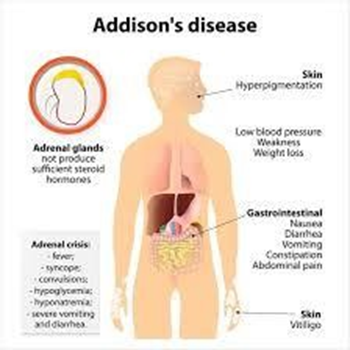A nurse is assessing a client who is admitted for elective surgery and has a history of Addison's disease. Which of the following findings should the nurse expect?
Intention tremors
Hyperpigmentation
Purple striations
Hirsutism
The Correct Answer is B
A. Intention tremors are not typically associated with Addison's disease.
B. Hyperpigmentation, particularly in sun-exposed areas and pressure points, is a characteristic finding in Addison's disease due to increased melanocyte-stimulating hormone (MSH) production.
C. Purple striations are typically associated with Cushing's syndrome, not Addison's disease.
D. Hirsutism (excessive hair growth) is not a common manifestation of Addison's disease. It is more associated with Cushing’s disease.

Nursing Test Bank
Naxlex Comprehensive Predictor Exams
Related Questions
Correct Answer is ["B","C","E"]
Explanation
A. Chronic lung disease is not typically identified as a risk factor for developing kidney disease.
B. Hypertension is a significant risk factor for kidney disease as it can damage blood vessels in the kidneys over time.
C. Diabetes, especially when uncontrolled, can lead to diabetic nephropathy, a common cause of kidney disease.
D. Coronary heart disease is primarily related to the cardiovascular system and is not directly associated with kidney disease.
E. Obesity increases the risk of developing kidney disease due to associated conditions such as hypertension and diabetes.
Correct Answer is A
Explanation
A. 0.45% sodium chloride, also known as half-normal saline, is a hypotonic solution with a lower concentration of sodium than normal serum levels. It can help to lower the sodium levels in a client with hypernatremia by diluting the excess sodium in the body.
B. Dextrose 10% in water is hypertonic and not appropriate for a client with hypernatremia, as it could exacerbate the imbalance.
C. Lactated Ringer's is isotonic and contains sodium in a similar concentration to serum levels, hence it could further increase the sodium levels.
D. Dextrose 5% in 0.9% sodium chloride (also known as D5NS) is a hypertonic solution that contains both dextrose and sodium. It would not be appropriate for a client with hypernatremia, as it could exacerbate the condition.
Whether you are a student looking to ace your exams or a practicing nurse seeking to enhance your expertise , our nursing education contents will empower you with the confidence and competence to make a difference in the lives of patients and become a respected leader in the healthcare field.
Visit Naxlex, invest in your future and unlock endless possibilities with our unparalleled nursing education contents today
Report Wrong Answer on the Current Question
Do you disagree with the answer? If yes, what is your expected answer? Explain.
Kindly be descriptive with the issue you are facing.
